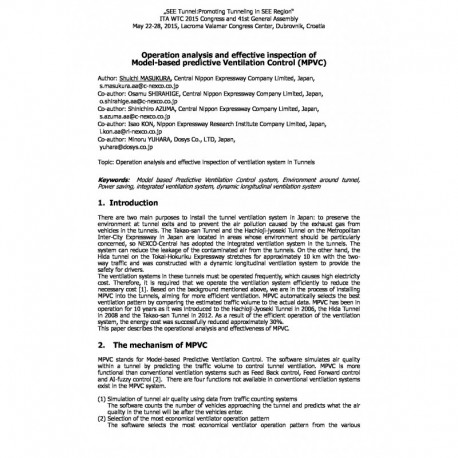Cart
0
0
No document
0,00 €
Total
Document successfully added to your shopping cart
Quantity
Total
There are 0 items in your cart.
There is 1 item in your cart.
Total documents
Total shipping
To be determined
Total
Search & filter
Search for a publication
Search & filter
Operation analysis and effective inspection of Model-based Predictive Ventilation Control (MPVC)
wtc2015_full_s.masukura
S. Masukura / O. Shirahige / S. Azuma / I. Kon / M. Yuhara
There are two main purposes to install the tunnel ventilation system in Japan: to preserve the environment at tunnel exits and to prevent the air pollution caused by the exhaust gas from vehicles in the tunnels. The Takao-san Tunnel and the Hachioji-jyoseki Tunnel on the Metropolitan Inter-City Expressway in Japan are located in areas whose environment should be particularly concerned, so NEXCO-Central has adopted the integrated ventilation system in the tunnels. The system can reduce the leakage of the contaminated air from the tunnels. On the other hand, the Hida tunnel on the Tokai-Hokuriku Expressway stretches for approximately 10 km with the two-way traffic and was constructed with a dynamic longitudinal ventilation system to provide the safety for drivers. The ventilation systems in these tunnels must be operated frequently, which causes high electricity cost. Therefore, it is required that we operate the ventilation system efficiently to reduce the necessary cost [1]. Based on the background mentioned above, we are in the process of installing MPVC into the tunnels, aiming for more efficient ventilation. MPVC automatically selects the best ventilation pattern by comparing the estimated traffic volume to the actual data. MPVC has been in operation for 10 years as it was introduced to the Hachioji-Jyoseki Tunnel in 2006, the Hida Tunnel in 2008 and the Takao-san Tunnel in 2012. As a result of the efficient operation of the ventilation system, the energy cost was successfully reduced approximately 30%. This paperdescribes the operational analysis and effectiveness of MPVC.




